动词形式填空单词表
高考英语语法填空进行时态知识点与必记的单词

高考英语语法填空进行时态知识点与必记的单词(经典版)编制人:__________________审核人:__________________审批人:__________________编制单位:__________________编制时间:____年____月____日序言下载提示:该文档是本店铺精心编制而成的,希望大家下载后,能够帮助大家解决实际问题。
文档下载后可定制修改,请根据实际需要进行调整和使用,谢谢!并且,本店铺为大家提供各种类型的经典范文,如演讲稿、总结报告、合同协议、方案大全、工作计划、学习计划、条据书信、致辞讲话、教学资料、作文大全、其他范文等等,想了解不同范文格式和写法,敬请关注!Download tips: This document is carefully compiled by this editor. I hope that after you download it, it can help you solve practical problems. The document can be customized and modified after downloading, please adjust and use it according to actual needs, thank you!In addition, this shop provides you with various types of classic sample essays, such as speech drafts, summary reports, contract agreements, project plans, work plans, study plans, letter letters, speeches, teaching materials, essays, other sample essays, etc. Want to know the format and writing of different sample essays, so stay tuned!高考英语语法填空进行时态知识点与必记的单词时态(tense)是一种动词形式,不同的时态用以表示不同的时间与方式。
be动词的基本用法

be动词的⼀一般现在时有三种形式,即:am, is, are。
1. 如果主语是第⼀一⼈人称I(我)时,be动词⽤用am。
如:I am a student. 我是⼀一名学⽣生。
I am 还可缩写成I'm。
如:I'm David. 我是⼤大卫。
2. 如果主语是you (你,你们), they (他们,它们,她们)或名词复数(两个以上的⼈人或物)时,be动词必须⽤用are。
如:Are you twelve? 你是⼗十⼆二岁吗?Tom and Lily are good friends. 汤姆和莉莉是好朋友。
They are at school. 他们在学校。
are与主语还可缩写。
如: We are= We're, They are =They're, You are = You're。
⽽而are与 not可缩写成aren't。
如:They aren't students. 他们不是学⽣生。
但是am与not不能缩写。
3. 如果主语是单数名词、不可数名词或单数第三⼈人称代词(he, she, it)时,be动词⽤用is。
如:My mother is a teacher. 我的妈妈是⼀一名⽼老师。
He is a student. 他是⼀一名学⽣生。
is也可与主语缩写,如: He is = He's, My mother is = My mother's等。
但是This is不可缩写。
⽽而is与not可缩写成 isn't。
如:This isn't a book. 这不是⼀一本书。
根据以上叙述我们可以把动词的⽤用法以⼝口诀的形式表述出来:我(I)是am,你(you)是are,剩下is留给她(she), 他(he), 它(it),两个以上都⽤用are。
[思路分析]be作助动词⽤用的形式如下:①am, is, are, was, were②助动词+be:shall be, will be, can be, etc.③have/has/had + been(完成时)④am, is, ⋯being(进⾏行时)[解题过程](1)表达进⾏行时态句型 be + V-ing⋯(进⾏行时态)例:What are you reading?(你正在阅读什么?)I am reading a magazine.(我正在阅读杂志。
初中英语动词时态归纳总结对照表
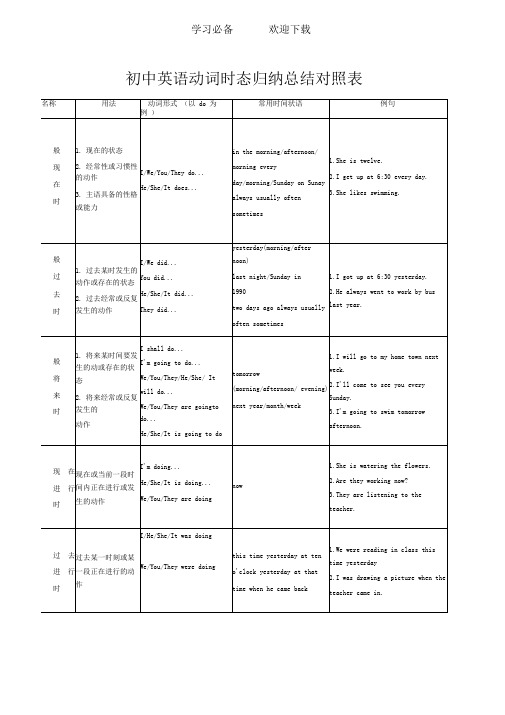
学习必备欢迎下载初中英语动词时态归纳总结对照表初中英语时态专项练习1、 一般现在时。
通常用 “ usually, often, every day, sometimes ”。
一般现在时基本用法介绍 一、一般现在时的功能1. 表示事物或人物的特征、状态。
如: The sky is blue. 天空是蓝色的。
2. 表示经常性或习惯性的动作。
如: I get up at six every day. 我每天六点起床。
3. 表示客观现实。
如: The earth goes around the sun. 地球绕着太阳转。
二、一般现在时的构成 : 肯定句 :1). 主语 +系动词 be(is, am, are )+ 名词(形容词,介词短语)2) . 其他主语 +动词原形 +其它第三人称单数 +动词 -s+ 其它 如: I am a boy. 我是一个男孩。
现 在完成 时过 去完成 时 现 1. 过去发生或已经 完成的某一动作对 现在造成的影响或 结果2. 表示过去已经开 始并持续到现在的 动作或状态过去某一时间前已 经发后的动作或状 态He/She/It has doneWe/You/They haveI/We/You/He/She/I t had done ⋯⋯.already just beforene verfor three years since 1990 this morning these daysby the end of ⋯when+ 一般过去时 before+ 一般过去时1.I've already posted the letter.2.We have known each other for ten years.3.They lived here since 1997.4.Have you ever been to Beijing?1.I had learned 2000 words by the end of last term.2.When I got out,the bus had already left.在完成 进 行 时现在以前的一段时 间里一直进行的动 作,这个运作可能 仍在进行 , 也可能 继I/We/You/They have been doing ⋯. He/She/It has been doing ⋯.since nine o ' clock for five hours1.I have been skating for five hours.2.She has been skating since nine o ' clock..We study English. 我们学习英语。
读短文,用所给动词的适当形式填空。 On the afternoon of May 28th, th
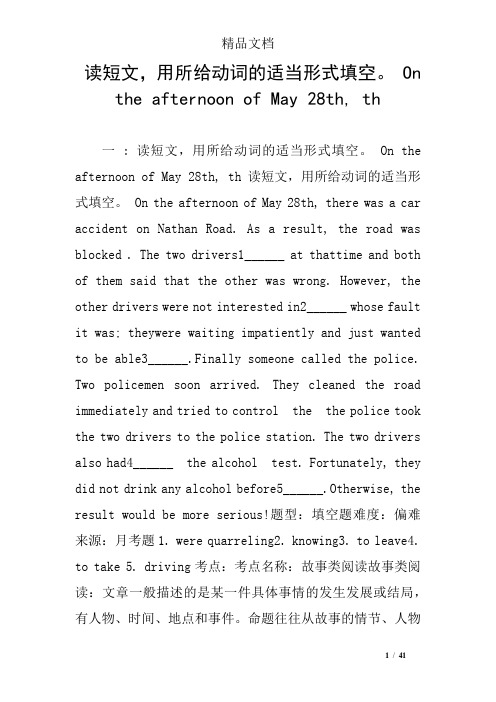
读短文,用所给动词的适当形式填空。
On the afternoon of May 28th, th一 : 读短文,用所给动词的适当形式填空。
On the afternoon of May 28th, th读短文,用所给动词的适当形式填空。
On the afternoon of May 28th, there was a car accident on Nathan Road. As a result, the road was blocked . The two drivers1______ at thattime and both of them said that the other was wrong. However, the other drivers were not interested in2______ whose fault it was; theywere waiting impatiently and just wanted to be able3______.Finally someone called the police. Two policemen soon arrived. They cleaned the road immediately and tried to control the the police took the two drivers to the police station. The two drivers also had4______ the alcohol test. Fortunately, they did not drink any alcohol before5______.Otherwise, the result would be more serious!题型:填空题难度:偏难来源:月考题1. were quarreling2. knowing3. to leave4. to take 5. driving考点:考点名称:故事类阅读故事类阅读:文章一般描述的是某一件具体事情的发生发展或结局,有人物、时间、地点和事件。
人教版初中英语七年级上册 专题三 用所给单词的适当形式填空150道(知识点全覆盖重难点易错点)

人教版七年级上册期末复习查缺补漏冲刺满分(重点知识+难点易错点)专题03 用所给单词的适当形式填空150道填空小技巧1.默会单词是第一进入初中以后,并不能单独的去默单词,更要关注:同一意义,不同的词性的词形。
如:读:read,动词,reading,动名词。
好:形容词good,副词well.2.动词的三单形式的正确应用仍然为期中试卷考查的热点和难点。
所以一定要弄清楚动词的三单形式,正确的用法。
2020 年期中试卷可以说都多次考查了三单的用法,是高频的高频考点。
如:(2)She enjoys reading comic books3.谓语动词和非谓语动词我们可以背诵一些基本的句型或者句型结构,帮助我们做题。
如:8.Kitty doesn't have much time to talk(talk) with his friends.根据: have time to do sth.即可解答本题。
类似:enjoy doing sth.; let sb.do sth.(此处do 是不带to的动词不定式,要注意与原形的区分。
如果记成原形,在被动语态时容易出现闲难。
3.名词的单复数变化,考查热点。
There are two________ (knife)on the table.答案knives4.再次强调:熟练默会动词的三单形式。
实战训练1.I want ________ ________ (meet) you on Saturday afternoon.2.Mary ________ (think) science is fun.3.We have eight________ (subject) at school this term.4.The ________ (four) lesson in the morning is science.5.She loves all her students but Ann and Tom are her ________ (favorite).6.There are two________ (knife)on the table.7.Look! Xiao Ming________ (swim)in the river.8.Please sit down. It's time________ have supper.9.Who can________ (sing) in English in your class?10.Mr.Green says the Chinese people are very________ (friend). 11.Who ______(like)biology best in your class?12.Is ______(Jenny)favorite city Beijing?13.My favorite ______(color)are blue and green.14.I like art because it's very ______(relax)and interesting.15.This is a ______(use)book.16.What can you see in the _______(three)picture?17.August is the _______(eight)month of the year.18.They are all good _______(student).19.My parents will have a big party for my sister’s _______(twelve)birthday. 20.This is my _______(brother)basketball. He loves sports.21.________ (Lucy) birthday is on May 5th.22.The ________ (one) picture is about a tennis star—Li Na.23.This is his ________ (nine) birthday.24.The store has some good school ________ (thing) on sale.25.They have two ________ (party) next month.26.Do you want________(have)a birthday party?27.When_________ (be)your parents’ birthday parties?28..October is the_________ (ten)month of a year.29.They are busy________ (do)their homework every day.30.March 8th is_________ (woman)Day.31.— How much _________(be)these socks?— They are $ 10.32.I need a pair of _________(shoe).33.They need eleven _________(woman)to sell these clothes. 34.Mary’s red skirt _________(look)nice.35.He needs _________(buy)some clothes.36.He needs 500 _________(dollar).37.How much __________(be) the trousers?38.He wants _______(play) volleyball.39.His brother likes ___________(watch) TV.40.The red skirts are on __________ (sell) today.41.These _______ (boy) are my good friends.42.These ________ (skirt) are Jenny's.43.This watch is nice.I want________ ________ (take) it.44.Daming ________ (help) me get the hat.45.Come and ________ (buy) your shoes at good prices.46.—Let's _________ (have) some chicken for lunch.—That sounds great.47.My grandfather has a good_________ (eat) habit.48.Tony wants_________ (watch) TV after dinner.49.Those are some_________ (tomato).50.Mike_________ (like) oranges very much.51.After school she plays games and______ (do) her homework.52.Let's ______ (have) apples and chicken for breakfast then.53.We need four ______ (tomato).54.It's dark. How about______ (go) home?55.I______ (real) like vegetables. They're good for us.56.Do you like ________ (strawberry)?57.My sister Ann ________ (real) wants to eat an ice-cream now.58.My father plays soccer ________ (good).59.Her grandma always ________ (eat) one banana in the evening.60.I want ________ (be) a sports star.61.(易错题)Here are five ________(tomato)and some ________(photo). 62.It's good for you to eat ________(carrot).63.I like ________(salad),but I don't like ________(chicken).64.My sister ________(like)vegetables but she ________(not like)carrots. 65.How about ________(have)some milk?66.Let me________ (get) the jacket for you.67.She________ (have) a CD player. It's on the table.68.I have three________ (baseball).70.They_________ (not) have a volleyball.71.Let's _______(play)games.72.He _______(watch)football games on TV.73.Let _______(I)get the ball.74.I _______(not have)a baseball.75._______ the girl _______(have)a soccer ball?76._________ you __________( have ) a tennis ball ?77._________ your cousin __________( play ) ping-pong?78.I have ten ping-pong __________( bat ) and seven __________( volleyball ) . 79.Allan __________ ( not have ) a brother.80.His name __________( sound ) fun.81.Can you ___________( bring ) your picture here ?82.That sounds ___________( well )83.Sonia ___________( watch ) TV in the morning.84.I have many ___________( friend ) here.85.I have only one __________( watch )86.Let _________( we ) have a look (看一看).87.They ________( not play ) sports. They only watch them on TV88.This is my ______ (parent) room. It’s very nice.89.Where _________ (be) your pencil boxes?90.This is my school bag. __________ (you) is on the desk.91.Are those his ___________ (tape)?92.Can you see those ___________ (play) there?93.I need some __________ (thing) for class today.94.Where are ___________ (they) pens?95.My friends have some __________ (radio).96.There are two__________ (photo) on the wall.97.Thanks for ________ (come) to my birthday party.98.Where ______(be) her keys?99.These ______(room) are too small.100.—Are the books in the schoolbag?101.______(they) cousins are in China now.102.His ping-pong bat is in his ________(parents) room.103.My pen and my pencil_________ (be) black.104.Betty _________ (think) Mr. Green is a good teacher.105.He is_________ (we) Chinese teacher.106.There are some_________ (tape) on the desk.107.Here are 20 _________ (chair). They are for students. 108.That black and white dog is ________ (my).109.These ________ (box) are not his.110.You can see________ (I) in the classroom.111.Here are some ________ (watch).112.—Are these your books?—No,they are ________ (Eric).113.This watch is not _______(your).114.These are _______(Mary)photos.115._______(I)pen is there. Hers is in the classroom.116.He is my brother. _______(he)name is Jack.117.Thank you for _______(help)me.118.Is Jane______ (she) friend?119.Are these your______ (key)?120.Here are five______ (family).121.______ (be) Tom your brother?122.The two jackets______ (be) blue.123.Are these your family ____________ (photo)?124.Lucy and Kate are from(来自)two ____________ (family). 125.That is Liu Mei. ____________ (her)is my sister. 126.This is Anna and ____________ (that)are her brothers. 127.The boy in the picture is ____________ (he)cousin. 128.We eat _______(health)food every day.129.John _______(not like)art at all.130.I like _______(play)tennis with my friends.一Let's eat _______(tomato)and fruit salad.132.Does Cindy want _______(have)vegetable salad?133.Bill _______ (like) watching TV.134._______ he _______ (have) a car?135.How about swimming? That _____ (sound) good.136.What time is it ? Sorry,I _____ (not know)137.She _______ (not have ) any money.138._______ he ______ (have) an eraser?139.Thank you for ______ (come)140.I _______ (love ) my parents.141.There _____ (be) a football and two baseballs.142.Do you have _____ (some) money?143.It is fine today! How about _________(go)fishing this afternoon? 144.John _________(have)a pen.145.Bob _________(watch)basketball games on TV every Sunday evening. 146.I want to play football with _________(I)friend.147.I want to buy some _________(tomato).148.___________ (who) hand bag is this ?149.Let’s keep _________ (diary), and record every little thing in our colorful life. 150.There ___ (be) lots of money in my purse.参考答案1.to meet2.thinks3.subjects4.fourth5.favorites【解析】1.句意:周六下午我想要见你。
be动词的基本用法
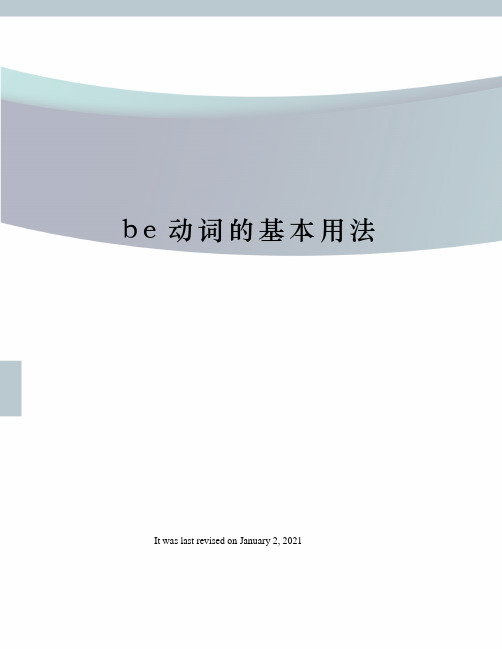
b e动词的基本用法 It was last revised on January 2, 2021be动词的一般现在时有三种形式,即:am, is, are。
1. 如果主语是第一人称I(我)时,be动词用am。
如:I am a student. 我是一名学生。
I am 还可缩写成I'm。
如:I'm David. 我是大卫。
2. 如果主语是you (你,你们), they (他们,它们,她们)或名词复数(两个以上的人或物)时,be动词必须用are。
如:Are you twelve 你是十二岁吗Tom and Lily are good friends. 汤姆和莉莉是好朋友。
They are at school. 他们在学校。
are与主语还可缩写。
如: We are= We're, They are =They're, You are = You're。
而are与 not可缩写成aren't。
如:They aren't students. 他们不是学生。
但是am与not不能缩写。
3. 如果主语是单数名词、不可数名词或单数第三人称代词(he, she, it)时,be 动词用is。
如:My mother is a teacher. 我的妈妈是一名老师。
He is a student. 他是一名学生。
is也可与主语缩写,如: He is = He's, My mother is = My mother's等。
但是This is不可缩写。
而is与not可缩写成 isn't。
如:This isn't a book. 这不是一本书。
根据以上叙述我们可以把动词的用法以口诀的形式表述出来:我(I)是am,你(you)是are,剩下is留给她(she), 他(he), 它(it),两个以上都用are。
[思路分析]be作助动词用的形式如下:①am, is, are, was, were②助动词 be:shall be, will be, can be, etc.③have/has/had been(完成时)④am, is, …being(进行时)[解题过程](1)表达进行时态句型 be V-ing…(进行时态)例:What are you reading?(你正在阅读什么)I am reading a magazine.(我正在阅读杂志。
三单形式的单词100个动词
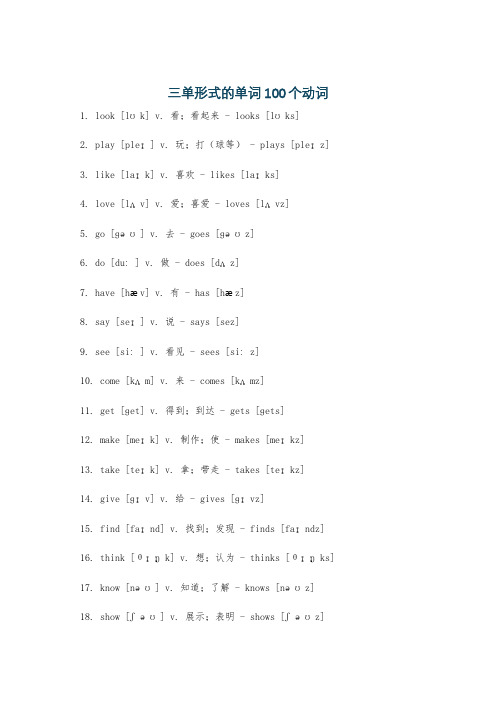
三单形式的单词100个动词1. look [lʊk] v. 看;看起来 - looks [lʊks]2. play [pleɪ] v. 玩;打(球等) - plays [pleɪz]3. like [laɪk] v. 喜欢 - likes [laɪks]4. love [lʌv] v. 爱;喜爱 - loves [lʌvz]5. go [ɡəʊ] v. 去 - goes [ɡəʊz]6. do [duː] v. 做 - does [dʌz]7. have [hæv] v. 有 - has [hæz]8. say [seɪ] v. 说 - says [sez]9. see [siː] v. 看见 - sees [siːz]10. come [kʌm] v. 来 - comes [kʌmz]11. get [ɡet] v. 得到;到达 - gets [ɡets]12. make [meɪk] v. 制作;使 - makes [meɪkz]13. take [teɪk] v. 拿;带走 - takes [teɪkz]14. give [ɡɪv] v. 给 - gives [ɡɪvz]15. find [faɪnd] v. 找到;发现 - finds [faɪndz]16. think [θɪŋk] v. 想;认为 - thinks [θɪŋks]17. know [nəʊ] v. 知道;了解 - knows [nəʊz]18. show [ʃəʊ] v. 展示;表明 - shows [ʃəʊz]19. work [wɜːk] v. 工作 - works [wɜːks]20. study [ˈstʌdi] v. 学习 - studies [ˈstʌdiz]21. try [traɪ] v. 尝试 - tries [traɪz]22. fly [flaɪ] v. 飞 - flies [flaɪz]23. cry [kraɪ] v. 哭;叫喊 - cries [kraɪz]24. buy [baɪ] v. 买 - buys [baɪz]25. sell [sel] v. 卖 - sells [selz]26. tell [tel] v. 告诉 - tells [telz]27. write [raɪt] v. 写 - writes [raɪts]28. read [riːd] v. 读 - reads [riːdz]29. run [rʌn] v. 跑 - runs [rʌnz]30. swim [swɪm] v. 游泳 - swims [swɪmz]31. sing [sɪŋ] v. 唱歌 - sings [sɪŋz]32. dance [dɑːns] v. 跳舞 - dances [ˈdɑːnsɪz]33. jump [dʒʌmp] v. 跳 - jumps [dʒʌmpz]34. walk [wɔːk] v. 散步;步行 - walks [wɔːkz]35. talk [tɔːk] v. 谈话 - talks [tɔːkz]36. listen [ˈlɪsn] v. 听 - listens [ˈlɪsnz]37. watch [wɒtʃ] v. 观看 - watches [ˈwɒtʃɪz]38. brush [brʌʃ] v. 刷 - brushes [brʌʃɪz]39. wash [wɒʃ] v. 洗 - washes [ˈwɒʃɪz]40. clean [kliːn] v. 打扫;清洁 - cleans [kliːnz]41. open [ˈəʊpən] v. 打开 - opens [ˈəʊpənz]42. close [kləʊz] v. 关闭 - closes [kləʊzɪz]43. drive [draɪv] v. 驾驶 - drives [draɪvz]44. ride [raɪd] v. 骑 - rides [raɪdz]45. draw [drɔː] v. 画画 - draws [drɔːz]46. eat [iːt] v. 吃 - eats [iːts]47. drink [drɪŋk] v. 喝 - drinks [drɪŋkz]48. sleep [sliːp] v. 睡觉 - sleeps [sliːps]49. wake [weɪk] v. 醒来 - wakes [weɪkz]50. sit [sɪt] v. 坐 - sits [sɪtɪz]51. stand [stænd] v. 站 - stands [stændz]52. begin [bɪˈɡɪn] v. 开始 - begins [bɪˈɡɪnz]53. end [end] v. 结束 - ends [endz]54. help [help] v. 帮助 - helps [helps]55. teach [tiːtʃ] v. 教 - teaches [ˈtiːtʃɪz]56. learn [lɜːn] v. 学习 - learns [lɜːnz]57. borrow [ˈbɒrəʊ] v. 借(入) - borrows [ˈbɒrəʊz]58. lend [lend] v. 借(出) - lends [lendz]59. forget [fəˈɡet] v. 忘记 - forgets [fəˈɡets]60. remember [rɪˈmembə(r)] v. 记得 - remembers [rɪˈmembəz]61. break [breɪk] v. 打破;弄坏 - breaks [breɪks]62. fix [fɪks] v. 修理 - fixes [fɪksɪz]63. use [juːz] v. 使用 - uses [juːzɪz]64. lose [luːz] v. 失去;丢失 - loses [ˈluːzɪz]65. win [wɪn] v. 赢;获胜 - wins [wɪnz]66. lose [luːz] v. 输 - loses [ˈluːzɪz]67. miss [mɪs] v. 想念;错过 - misses [ˈmɪsɪz]68. need [niːd] v. 需要 - needs [niːdz]69. want [wɒnt] v. 想要 - wants [wɒntz]70. plant [plɑːnt] v. 种植 - plants [plɑːntz]71. cut [kʌt] v. 切;割 - cuts [kʌtɪz]72. put [pʊt] v. 放 - puts [pʊtɪz]73. stay [steɪ] v. 停留;待 - stays [steɪz]74. leave [liːv] v. 离开 - leaves [liːvz]75. arrive [əˈraɪv] v. 到达 - arrives [əˈraɪvz]76. carry [ˈkæri] v. 携带;搬运 - carries [ˈkæriz]77. push [pʊʃ] v. 推 - pushes [pʊʃɪz]78. pull [pʊl] v. 拉 - pulls [pʊlɪz]79. answer [ˈɑːnsə(r)] v. 回答 - answers [ˈɑːnsəz]80. ask [ɑːsk] v. 问 - asks [ɑːskɪz]81. call [kɔːl] v. 打电话;称呼 - calls [kɔːlɪz]82. email [ˈiːmeɪl] v. 发电子邮件 - emails [ˈiːmeɪlz]83. text [tekst] v. 发短信 - texts [teksts]84. cook [kʊk] v. 做饭 - cooks [kʊkz]85. bake [beɪk] v. 烘焙 - bakes [beɪkz]86. fry [fraɪ] v. 油炸 - fries [fraɪz]87. boil [bɔɪl] v. 煮 - boils [bɔɪlz]88. taste [teɪst] v. 品尝 - tastes [teɪsts]89. smell [smel] v. 闻起来;闻 - smells [smelz]90. feel [fiːl] v. 感觉 - feels [fiːlz]91. touch [tʌtʃ] v. 触摸 - touches [ˈtʌtʃɪz]92. see off [siːɒf] v. 送行 - sees off [siːz ɒf]93. pick up [pɪk ʌp] v. 捡起;接(某人) - picks up [pɪk ʌp]94. put on [pʊt ɒn] v. 穿上 - puts on [pʊt ɒn]95. take off [teɪk ɒf] v. 脱下;起飞 - takes off [teɪk ɒf]96. turn on [tɜːn ɒn] v. 打开(电器等) - turns on [tɜːn ɒn]97. turn off [tɜːn ɒf] v. 关闭(电器等) - turns off [tɜːn ɒf]98. look for [lʊk fɔː(r)] v. 寻找 - looks for [lʊk fɔːz]99. wait for [weɪt fɔː(r)] v. 等待 - waits for [weɪt fɔːz]100. depend on [dɪˈpend ɒn] v. 取决于;依靠 - depends on [dɪˈpend ɒn]。
动词的形式和分类
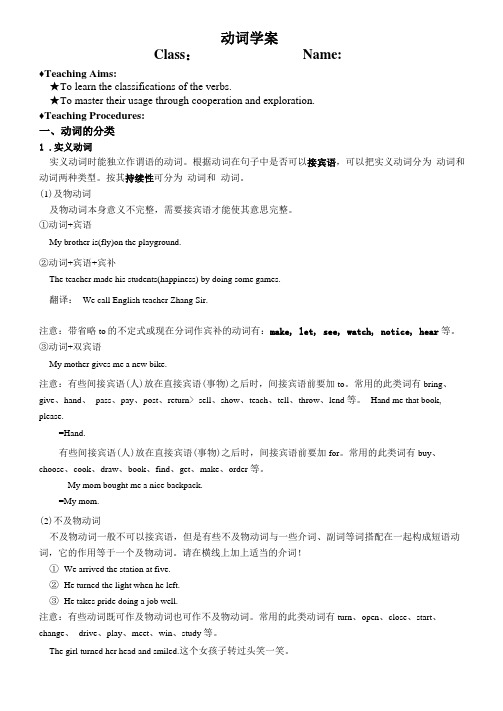
Class :♦Teaching Aims: ★To learn the classifications of the verbs.★To master their usage through cooperation and exploration.♦Teaching Procedures:一、动词的分类1 .实义动词实义动词时能独立作谓语的动词。
根据动词在句子中是否可以接宾语,可以把实义动词分为 动词和 动词两种类型。
按其持续性可分为 动词和 动词。
(1)及物动词及物动词本身意义不完整,需要接宾语才能使其意思完整。
①动词+宾语My brother is(fly)on the playground.②动词+宾语+宾补The teacher made his students(happiness) by doing some games.翻译: We call English teacher Zhang Sir.注意:带省略to 的不定式或现在分词作宾补的动词有:make, let, see, watch, notice, hear 等。
③动词+双宾语My mother gives me a new bike.注意:有些间接宾语(人)放在直接宾语(事物)之后时,间接宾语前要加to 。
常用的此类词有bring 、 give 、hand 、 pass 、pay 、post 、return > sell 、show 、teach 、tell 、throw 、lend 等。
Hand me that book, please.=Hand.有些间接宾语(人)放在直接宾语(事物)之后时,间接宾语前要加for 。
常用的此类词有buy 、 choose 、cook 、draw 、book 、find 、get 、make 、order 等。
My mom bought me a nice backpack.=My mom.(2)不及物动词不及物动词一般不可以接宾语,但是有些不及物动词与一些介词、副词等词搭配在一起构成短语动 词,它的作用等于一个及物动词。
英语动词过去式大全

英语动词过去式大全1.直接加“ed”:work look2.以不发音的字母“e”结尾的单词,直接加“d”:live hope use 3.以辅音字母+y结尾的,变y为i加“ed”:study carry worry4. 以元音字母+y结尾的,直接加“ed”:enjoy play5. 以重读闭音节结尾的,双写最后的辅音字母+ed:stop plan一、AAA型(原形→原形→原形)read read read 读cut cut cut 切,割let let let 让put put put 放cost cost cost 花费,值hit hit hit 撞,击set set set 安排,安置hurt hurt hurt 使…伤痛二、初中英语常用不规则动词表am/is was been 是are were been 是beat beat beaten 打败become became become 成为begin began begun 开始bring brought brought 带来build built built 建造buy bought bought 买can could ∕能choose chose chosen 选择come came come 来do did done 做draw drew drawn 画dream dreamed dreamed 做梦drink drank drunk 喝drive drove driven 驾驶eat ate eaten 吃fall fell fallen 落下feed fed fed 喂feel felt felt 感到fight fought fought 打架find found found 发现get got got 得到give gave given 给go went gone 走grow grew grown 生长have had had 有,吃hear heard heard 听见keep kept kept 保持know knew known 知道lie lied lied 说谎lie lay lain 躺lose lost lost 丢失make made made 制造may might ∕也许mean meant meant 意思meet met met 遇见pay paid paid 付钱run ran run 跑say said said 说see saw seen 看见send sent sent 送,寄shall should ∕将要show showed showed 给…看sing sang sung 唱sit sat sat 坐sleep slept slept 睡smell smelled smelled 闻speak spoke spoken 说stand stood stood 站swim swam swum 游泳take took taken 拿teach taught taught 教tell told told 告诉think thought thought 思考wake waked waked 醒wear wore worn 穿will would ∕会win won won 赢write wrote written 写练习题一、句型转换1. The children had a good time in the park.否定句:__________________________________________一般疑问句:________________________________________2. There were about nine hundred people at the concert.否定句:__________________________________________一般疑问句:________________________________________3. Ann did her homework yesterday evening.否定句:__________________________________________一般疑问句:________________________________________4. Last week I read an English book.否定句:__________________________________________一般疑问句:________________________________________肯定/否定回答:____________________________________5. My brother was in the park just now.否定句:__________________________________________一般疑问句:________________________________________二、写出下列动词的第三人称单数形式、过去式形式go _______ _______ enjoy _______ _______ buy _______ _______ eat _______ _______ get _______ _______ walk _______ _______take _______ _______ dance _______ _______ write _______ _______run _______ _______ swim _______ _______ find _______ _______begin _______ _______ eat _______ _____ play _______ _______三、用所给词的适当形式填空。
连系动词(用单词适当形式填空 20题 含解析)初中英语专题练习

连系动词(用单词适当形式填空20题含解析)初中英语专题练习一、用单词适当形式填空20题1.There (be) some eggs and milk in the fridge.2.These clothes (be) very popular last year.3.What (be) he doing now?4.—How much orange juice (be) there in the bottle?—Only a little!5.How (be) the weather in Ganzhou?6.Tom’s mum told us that he (be) helping her with housework.7.Half of the books in the library (be) new.8.He seems (be) unhappy because he lost his pen.9.— (be) you watching TV now?—No, I (be) not.10.So far, Mr Smith (be) in Hong Kong for three days and will be back in two days. 11.—This song (sound) very nice. Do you like it, too?—Yes, I like it very much.12.There once a few farms at the foot of the hill. (be)13.The weather (be) cloudy today.14.In 2020, more than half of the population in my village (be) able to open online shops to sell delicious food.15.Look! She is wearing a new skirt and (look) so happy.16.I (be) a boy of Grade Four.17.Please (be) late for school next time.18.Not only the students but also their teacher (be) happy with the class party yesterday.19.His grandparents (not be) at home this morning. They went to the supermarket. 20.—I can’t find my mother. Where is she?—She (plant) flowers in the garden.参考答案:1.are【详解】句意:冰箱里有一些鸡蛋和牛奶。
英语五年级单词表下册

英语五年级单词表下册人教版英语五年级下册单词表。
Unit 1.1. eat breakfast [iːt ˈbrekfəst](动词短语)2. have…class [hæv … klɑːs](动词短语)3. play sports [pleɪ spɔːts](动词短语)4. exercise [ˈeksəsaɪz](名词/动词)5. do morning exercises [duːˈmɔːnɪŋˈeksəsaɪzɪz](动词短语)6. eat dinner [iːt ˈdɪnə(r)](动词短语)7. clean my room [kliːn maɪ ruːm](动词短语)8. go for a walk [ɡəʊ fɔː(r) ə wɔːk](动词短语)9. go shopping [ɡəʊˈʃɒpɪŋ](动词短语)10. take [teɪk](动词)11. take a dancing class [teɪk əˈdɑːnsɪŋ klɑːs](动词短语)12. when [wen](副词)13. after [ˈɑːftə(r)](介词/副词)14. start [stɑːt](动词)15. usually [ˈjuːʒuəli](副词)16. Spain [speɪn](名词)17. late [leɪt](形容词/副词)18. a.m. [ˌeɪˈem](缩写,上午)19. p.m. [ˌpiːˈem](缩写,下午)20. why [waɪ](副词)21. shop [ʃɒp](名词/动词)22. work [wɜːk](名词/动词)23. last [lɑːst](形容词/副词/动词)24. sound [saʊnd](名词/动词)25. also [ˈɔːlsəʊ](副词)26. busy [ˈbɪzi](形容词)27. need [niːd](动词/名词)28. play [pleɪ](动词)29. letter [ˈletə(r)](名词)30. live [lɪv](动词)31. island [ˈaɪlənd](名词)32. always [ˈɔːlweɪz](副词)33. cave [keɪv](名词)34. go swimming [ɡəʊˈswɪmɪŋ](动词短语)35. win [wɪn](动词)Unit 2.1. spring [sprɪŋ](名词)2. summer [ˈsʌmə(r)](名词)3. fall [fɔːl](名词,美式英语,秋天)4. autumn [ˈɔːtəm](名词,英式英语,秋天)5. season [ˈsiːzn](名词)6. picnic [ˈpɪknɪk](名词)7. go on a picnic [ɡəʊɒn əˈpɪknɪk](动词短语)8. pick [pɪk](动词)9. pick apples [pɪk ˈæplz](动词短语)10. snow [snəʊ](名词/动词)11. make a snowman [meɪk əˈsnəʊmæn](动词短语)12. go swimming [ɡəʊˈswɪmɪŋ](动词短语)13. which [wɪtʃ](代词)14. best [best](形容词/副词的最高级)15. snowy [ˈsnəʊi](形容词)16. good job [ɡʊ d dʒəʊb](短语,做得好)17. because [bɪˈkɔːz](连词)18. vacation [vəˈkeɪʃn](名词)19. all [ɔːl](形容词/副词/代词)20. pink [pɪŋk](名词/形容词)21. lovely [ˈlʌvli](形容词)22. leaf [liːf](名词,复数leaves [liːvz])23. fall [fɔːl](动词,落下;掉下)24. paint [peɪnt](名词/动词)Unit 3.1. January [ˈdʒænjuəri](名词)2. February [ˈfebruəri](名词)3. March [mɑːtʃ](名词)4. April [ˈeɪprəl](名词)5. May [meɪ](名词)6. June [dʒuːn](名词)7. July [dʒuːlaɪ](名词)8. August [ˈɔːɡəst](名词)9. September [sepˈtembə(r)](名词)10. October [ɒkˈtəʊbə(r)](名词)11. November [nəʊˈvembə(r)](名词)12. December [dɪˈsembə(r)](名词)13. few [fjuː](形容词)14. a few [ə fjuː](短语,一些;几个)15. thing [θɪŋ](名词)16. meet [miːt](动词)17. sports meet [spɔːts miːt](名词短语,运动会)18. Easter [ˈiːstə(r)](名词)19. trip [trɪp](名词)20. year [jɪə(r)](名词)21. plant [plɑːnt](名词/动词)22. contest [ˈkɒntest](名词)23. the Great Wall [ðəɡreɪt wɔːl](专有名词,长城)24. national [ˈnæʃnəl](形容词)25. National Day [ˈnæʃnəl deɪ](专有名词,国庆节)26. American [əˈmerɪkən](名词/形容词)27. Thanksgiving [ˌθæŋksˈɡɪvɪŋ](名词)28. Christmas [ˈkrɪsməs](名词)29. holiday [ˈhɒlədeɪ](名词)30. game [ɡeɪm](名词)31. roll [rəʊl](动词)32. look for [lʊk fɔː(r)](动词短语,寻找)33. chocolate [ˈtʃɒklət](名词)34. bunny [ˈbʌni](名词)35. RSVP [ˌɑːr es viːˈpiː](缩写,(尤用于请柬)请赐复)36. by [baɪ](介词)Unit 4.1. first [fɜːst](序数词/形容词/副词)2. second [ˈsekənd](序数词/名词/形容词/副词)3. third [θɜːd](序数词/形容词/副词)4. fourth [fɔːθ](序数词/形容词/副词)5. fifth [fɪfθ](序数词/形容词/副词)6. eighth [eɪtθ](序数词/形容词/副词)7. ninth [naɪnθ](序数词/形容词/副词)8. twelfth [twelfθ](序数词/形容词/副词)9. twentieth [ˈtwentiəθ](序数词/形容词/副词)10. twenty - first [ˈtwenti fɜːst](序数词)11. twenty - third [ˈtwenti θɜːd](序数词)12. thirtieth [ˈθɜːtiəθ](序数词/形容词/副词)13. special [ˈspeʃl](形容词)14. fool [fuːl](名词/动词)15. kitten [ˈkɪtn](名词)16. diary [ˈdaɪəri](名词)17. still [stɪl](副词)18. noise [nɔɪz](名词)20. open [ˈəʊpən](动词/形容词)21. walk [wɔːk](名词/动词)Unit 5.1. mine [maɪn](名词性物主代词)2. yours [jɔːrs](名词性物主代词)3. his [hɪz](名词性物主代词/形容词性物主代词)4. hers [hɜːrs](名词性物主代词)5. theirs [ðeəz](名词性物主代词)6. ours [ˈaʊəz](名词性物主代词)7. climbing [ˈklaɪmɪŋ](动词 - climb的动名词形式)8. eating [ˈiːtɪŋ](动词 - eat的动名词形式)9. playing [ˈpleɪɪŋ](动词 - play的动名词形式)10. jumping [ˈdʒʌmpɪŋ](动词 - jump的动名词形式)11. drinking [ˈdrɪŋkɪŋ](动词 - drink的动名词形式)12. sleeping [ˈsliːpɪŋ](动词 - sleep的动名词形式)13. each [iːtʃ](代词/形容词)14. other [ˈʌðə(r)](形容词/代词)15. each other [iːtʃˈʌðə(r)](短语,互相)16. excited [ɪkˈsaɪtɪd](形容词)18. of [ɒv](介词)Unit 6.1. doing morning exercises [ˈduːɪŋˈmɔːnɪŋˈeksəsaɪzɪz](动词短语)2. having…class [ˈhævɪŋ… klɑːs](动词短语)3. eating lunch [ˈiːtɪŋ lʌntʃ](动词短语)4. reading a book [ˈriːdɪŋə bʊk](动词短语)5. listening to music [ˈlɪsnɪŋ tuːˈmjuːzɪk](动词短语)6. keep [kiːp](动词)7. keep to the right [kiːp tuːðə raɪt](动词短语)8. keep your desk clean [kiːp jɔː(r) desk kliːn](动词短语)9. talk quietly [tɔːk ˈkwaɪətli](动词短语)10. turn [tɜːn](动词/名词)11. take turns [teɪk tɜːnz](动词短语)12. bamboo [ˌbæmˈbuː](名词)13. its [ɪts](形容词性物主代词/名词性物主代词)14. show [ʃəʊ](动词/名词)15. anything [ˈeniθɪŋ](代词)16. else [els](形容词/副词)17. exhibition [ˌeksɪˈbɪʃn](名词)18. say [seɪ](动词)19. have a look [hæv ə lʊk](动词短语)20. sushi [ˈsuːʃi](名词)21. teach [tiːtʃ](动词)22. Canadian [kəˈneɪdiən](名词/形容词)23. Spanish [ˈspænɪʃ](名词/形容词)。
用所给动词的适当形式填空
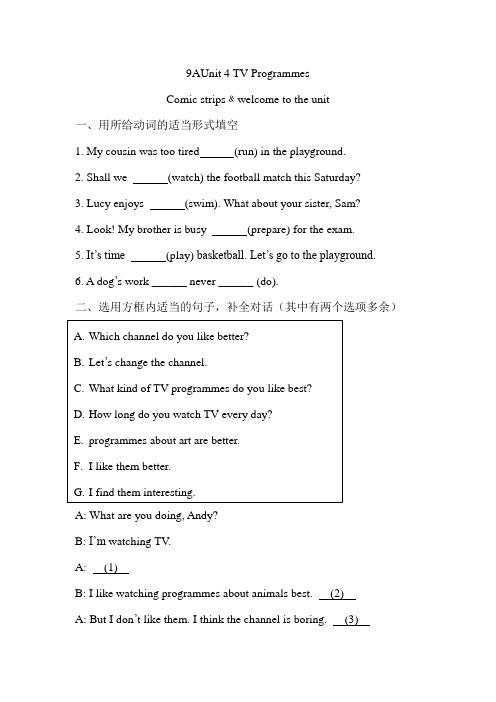
9AUnit 4 TV ProgrammesComic strips﹠welcome to the unit一、用所给动词的适当形式填空1. My cousin was too tired (run) in the playground.2. Shall we (watch) the football match this Saturday?3. Lucy enjoys (swim). What about your sister, Sam?4. Look! My brother is busy (prepare) for the exam.5. It’s time (play) basketball. Let’s go to the playground.6. A dog’s work ______ never ______ (do).二、选用方框内适当的句子,补全对话(其中有两个选项多余)A: What are you doing, Andy?B: I’m watching TV.A: (1)B: I like watching programmes about animals best. (2)A: But I don’t like them. I think the channel is boring. (3)B: OK. What’s your favourite TV programme?.A: I think (4) I like them better.B: (5)A: About three hours.B: Ye! I think you spend too much time on TV. It’s bad for your study.Reading I一、根据汉语提示和句意,写出合适的单词1. Our Chinese teacher will tell us the ____ (最新的)news after class.2. The film Hero is very wonderful. It’s ____ (执导)by Zhang Yimou.3. He ran fast and soon ____ (消失) at the end of the road.4. My father will go to the____ (音乐会) with me this evening.5. The children in poor areas are still ____ (面对) many serious problems.二、根据课文内容和首字母提示,写出合适的单词Millie is reading a TV guide online. She is also discussing w 1 her friends about their favourite TV programmes. Sports World will be on TV b 2 10:00 a.m. and 11:30 a.m. If you watch Sports World, you will hear a w 3 round-up of what is happening in sports. This week it is all about football, including some i 4 with some famous football players. Simon likes it best. This year’s Beijing Music Awards will be on TV this c 5 Saturday. It will be a good show to watch. Many famous stars will attend. The results will be a 6 during the programme. It’sAmy’s favourite programme. There will be a h7 film tonight. In this film, a doctor is k 8 . The a 9 are all new, yet they do very well. Tiger Watch is about the life of t 10 in India. You can see s 11 in India, one of the few p 12 on Earth where tigers still live.Reading II一、单项选择1. My grandpa ____ for about three years.A. has been deadB. has diedC. is dyingD. has dead2. Can you help me ____ who broke the window just now?A. look forB. look atC. findD. find out3. There are about ____ students in our school.A. one thousandB. one thousandsC. thousand ofD. thousands of4. ____ teachers will come to our school tomorrow. The number ____ fifty.A. A number of, areB. The number of, areC. A number of, isD. The number of, is5. This TV play is very ____, and we are all ____ in it.A. interesting, interestingB. interested, interestedC. interesting, interestedD. interested, interesting二、阅读短文,完成文后各题Dear Sir,As a middle school teacher and a mother of two children, I think your article is very interesting. However, my views(观点) on the subject are a bit difference from yours. For years, many writers have criticized (批评) TV programmes. Often, they don’t think about television as a positive (积极的) learning tool(工具). I A (use) TV in my classroom for years, and it has helped make learning a much more interesting experience for my young students.In my opinion (观点), TV can be helpful to young students. When it is used in the right way, it can even speed up (加速) the learning process. I use TV programmes to teach Geography, Science and even reading. My students’ higher test marks prove that this method (方法) is working. Both of my children love watching the TV programme Sesame Street and they are now among the top students in their school. These types of programmes help students learn basic (基础的) language skills like the alphabet (字母表), and how to count (计算). They can also teach children things like sharing, B (protect) environment and caring about others.I think it’s time to stop criticizing TV, and focus on (集中于) its amazing use for learning.1.用所给词的适当形式填空。
小学毕业总复习单词表动词形式
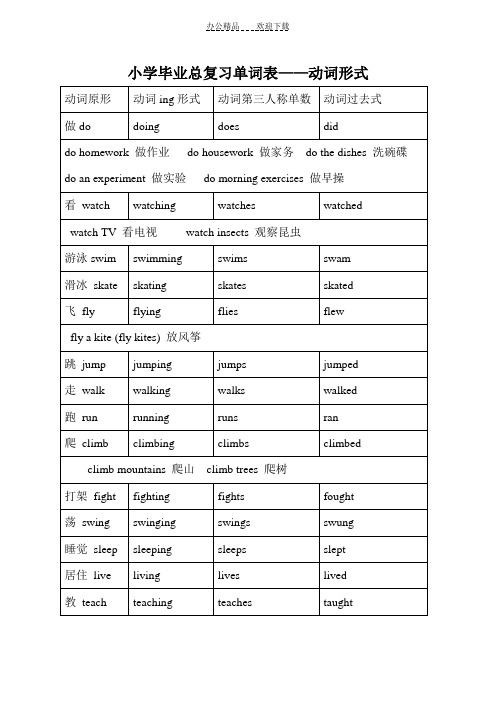
going
goes
went
go to school上学go home回家go to bed睡觉go hiking去远足
go to the cinema去看电影go straight直走go skiing去滑雪
go to work去上班go on a big trip去旅行go back
go shopping买东西go ice-skating去滑冰go on a big trip去旅行
读书read
reading
reads
read
read a book (read books)读书read a magazine读杂志
read newspapers看报纸
买buy
buying
buys
bought
buy presents买礼物
划row
rowing
rows
rowed
row a boat划船
小学毕业总复习单词表——动词形式
动词原形
动词ing形式
动词第三人称单数
动词过去式
做do
doing
does
did
do homework做作业do housework做家务do the dishes洗碗碟
do an experiment做实验do morning exercises做早操
看watch
watching
plant trees种树plant flowers种花
画画draw
drawing
draws
drew
draw pictures
take
taking
takes
took
take pictures (photos)照相take a trip去旅行take off脱下
五年级下册 英语单词表
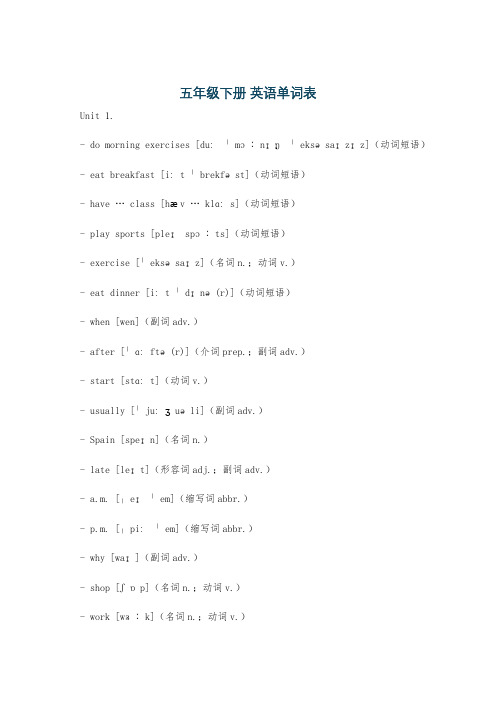
五年级下册英语单词表Unit 1.- do morning exercises [duːˈmɔːnɪŋˈeksəsaɪzɪz](动词短语)- eat breakfast [iːt ˈbrekfəst](动词短语)- have … class [hæv … klɑːs](动词短语)- play sports [pleɪ spɔːts](动词短语)- exercise [ˈeksəsaɪz](名词n.;动词v.)- eat dinner [iːt ˈdɪnə(r)](动词短语)- when [wen](副词adv.)- after [ˈɑːftə(r)](介词prep.;副词adv.)- start [stɑːt](动词v.)- usually [ˈjuːʒuəli](副词adv.)- Spain [speɪn](名词n.)- late [leɪt](形容词adj.;副词adv.)- a.m. [ˌeɪˈem](缩写词abbr.)- p.m. [ˌpiːˈem](缩写词abbr.)- why [waɪ](副词adv.)- shop [ʃɒp](名词n.;动词v.)- work [wɜːk](名词n.;动词v.)- last [lɑːst](形容词adj.;副词adv.;动词v.)- sound [saʊnd](名词n.;动词v.;形容词adj.)- also [ˈɔːlsəʊ](副词adv.)- busy [ˈbɪzi](形容词adj.)- need [niːd](动词v.;名词n.)- play [pleɪ](动词v.;名词n.)- letter [ˈletə(r)](名词n.)- live [lɪv](动词v.)- island [ˈaɪlənd](名词n.)- always [ˈɔːlweɪz](副词adv.)- cave [keɪv](名词n.)- go swimming [ɡəʊˈswɪmɪŋ](动词短语)- win [wɪn](动词v.)Unit 2.- spring [sprɪŋ](名词n.;形容词adj.)- summer [ˈsʌmə(r)](名词n.;形容词adj.)- fall [fɔːl](名词n.;动词v.)(美式英语,等同于autumn)- winter [ˈwɪntə(r)](名词n.;形容词adj.)- season [ˈsiːzn](名词n.)- picnic [ˈpɪknɪk](名词n.;动词v.)- go on a picnic [ɡəʊɒn əˈpɪknɪk](动词短语)- pick [pɪk](动词v.)- pick apples [pɪk ˈæplz](动词短语)- snow [snəʊ](名词n.;动词v.)- make a snowman [meɪk əˈsnəʊmæn](动词短语)- go swimming [ɡəʊˈswɪmɪŋ](动词短语)- which [wɪtʃ](形容词adj.;代词pron.)- best [best](形容词adj.;副词adv.)- snowy [ˈsnəʊi](形容词adj.)- good job [ɡʊ d dʒəʊb](短语)- because [bɪˈkɔːz](连词conj.)- vacation [vəˈkeɪʃn](名词n.)- all [ɔːl](形容词adj.;副词adv.;代词pron.)- pink [pɪŋk](名词n.;形容词adj.)- lovely [ˈlʌvli](形容词adj.)- leaf [liːf](名词n.)(复数leaves [liːvz])- fall [fɔːl](动词v.,表示落下,美式英语用法,等同于英式英语的drop)- paint [peɪnt](名词n.;动词v.)Unit 3.- January [ˈdʒænjuəri](名词n.)- February [ˈfebruəri](名词n.)- March [mɑːtʃ](名词n.)- April [ˈeɪprəl](名词n.)- May [meɪ](名词n.)- June [dʒuːn](名词n.)- July [dʒuːˈlaɪ](名词n.)- August [ˈɔːɡəst](名词n.)- September [sepˈtembə(r)](名词n.)- October [ɒkˈtəʊbə(r)](名词n.)- November [nəʊˈvembə(r)](名词n.)- December [dɪˈsembə(r)](名词n.)- few [fjuː](形容词adj.;代词pron.)- a few [ə fjuː](短语)- thing [θɪŋ](名词n.)- meet [miːt](动词v.)- sports meet [spɔːts miːt](名词短语)- Easter [ˈiːstə(r)](名词n.)- trip [trɪp](名词n.;动词v.)- national [ˈnæʃnəl](形容词adj.)- National Day [ˈnæʃnəl deɪ](名词短语)- American [əˈmerɪkən](形容词adj.;名词n.)- Thanksgiving [ˌθæŋksˈɡɪvɪŋ](名词n.)- Christmas [ˈkrɪsməs](名词n.)- holiday [ˈhɒlədeɪ](名词n.)- game [ɡeɪm](名词n.)- roll [rəʊl](动词v.;名词n.)- look for [lʊk fɔː(r)](动词短语)- chocolate [ˈtʃɒklət](名词n.)- bunny [ˈbʌni](名词n.)- RSVP [ˌɑːr es viːˈpiː](缩写词abbr.,源自法语Répondez s'il vous plaît,请回复)- by [baɪ](介词prep.)Unit 4.- first (1st) [fɜːst](形容词adj.;副词adv.;数词num.)- second (2nd) [ˈsekənd](形容词adj.;副词adv.;数词num.)- third (3rd) [θɜːd](形容词adj.;副词adv.;数词num.)- fourth (4th) [fɔːθ](形容词adj.;副词adv.;数词num.)- fifth (5th) [fɪfθ](形容词adj.;副词adv.;数词num.)- eighth (8th) [eɪtθ](形容词adj.;副词adv.;数词num.)- ninth (9th) [naɪnθ](形容词adj.;副词adv.;数词num.)- twelfth (12th) [twelfθ](形容词adj.;副词adv.;数词num.)- twentieth (20th) [ˈtwentiəθ](形容词adj.;副词adv.;数词num.)- twenty - first (21st) [ˌtwenti ˈfɜːst](形容词adj.;副词adv.;数词num.)- twenty - third (23rd) [ˌtwenti ˈθɜːd](形容词adj.;副词adv.;数词num.)- thirtieth (30th) [ˈθɜːtiəθ](形容词adj.;副词adv.;数词num.)- special [ˈspeʃl](形容词adj.)- fool [fuːl](名词n.;动词v.)- April Fool's Day [ˈeɪprəl fuːlz deɪ](名词短语)- no [nəʊ](形容词adj.;副词adv.)- kitten [ˈkɪtn](名词n.)- diary [ˈdaɪəri](名词n.)- still [stɪl](副词adv.;形容词adj.)- noise [nɔɪz](名词n.)- fur [fɜː(r)](名词n.)- open [ˈəʊpən](动词v.;形容词adj.;名词n.)- walk [wɔːk](动词v.;名词n.)Unit 5.- mine [maɪn](名词性物主代词pron.)- yours [jɔːrs](名词性物主代词pron.)- his [hɪz](形容词性物主代词adj.;名词性物主代词pron.)- hers [hɜːrs](名词性物主代词pron.)- theirs [ðeəz](名词性物主代词pron.)- ours [ˈaʊəz](名词性物主代词pron.)- climbing [ˈklaɪmɪŋ](动词v - climb的动名词形式)- eating [ˈiːtɪŋ](动词v - eat的动名词形式)- playing [ˈpleɪɪŋ](动词v - play的动名词形式)- jumping [ˈdʒʌmpɪŋ](动词v - jump的动名词形式)- drinking [ˈdrɪŋkɪŋ](动词v - drink的动名词形式)- sleeping [ˈsliːpɪŋ](动词v - sleep的动名词形式)- each [iːtʃ](形容词adj.;代词pron.)- other [ˈʌðə(r)](形容词adj.;代词pron.)- each other [iːtʃˈʌðə(r)](短语)- excited [ɪkˈsaɪtɪd](形容词adj.)- like [laɪk](动词v.;介词prep.)- lovely [ˈlʌvli](形容词adj.)Unit 6.- doing morning exercises [ˈduːɪŋˈmɔːnɪŋˈeksəsaɪzɪz](动词短语 - do morning exercises的现在分词形式)- having … class [ˈhævɪŋ… klɑːs](动词短语 - have … class的现在分词形式)- eating lunch [ˈiːtɪŋ lʌntʃ](动词短语 - eat lunch的现在分词形式)- reading a book [ˈriːdɪŋə bʊk](动词短语)- listening to music [ˈlɪsnɪŋ tuːˈmjuːzɪk](动词短语)- keep [kiːp](动词v.)- keep to the right [kiːp tuːðə raɪt](动词短语)- keep your desk clean [kiːp jɔː(r) desk kliːn](动词短语)- talk quietly [tɔːk ˈkwaɪətli](动词短语)- turn [tɜːn](动词v.;名词n.)- take turns [teɪk tɜːns](动词短语)- bamboo [ˌbæmˈbuː](名词n.)- its [ɪts](形容词性物主代词adj.;名词性物主代词pron.)- show [ʃəʊ](动词v.;名词n.)- anything [ˈeniθɪŋ](代词pron.)- else [els](形容词adj.;副词adv.)- exhibition [ˌeksɪˈbɪʃn](名词n.)- say [seɪ](动词v.)- have a look [hæv ə lʊk](动词短语)- sushi [ˈsuːʃi](名词n.)- teach [tiːch](动词v.)- Canadian [kəˈneɪdiən](形容词adj.;名词n.)- Spanish [ˈspænɪʃ](形容词adj.;名词n.)。
Be动词的用法
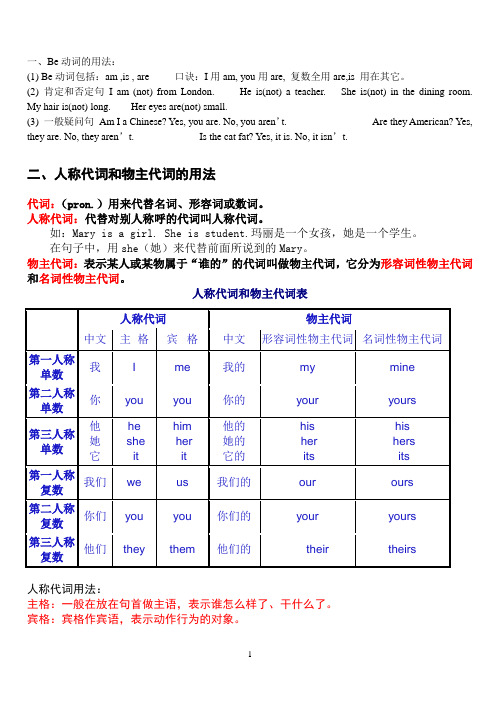
一、Be动词的用法:(1) Be动词包括:am ,is , are 口诀:I用am, you用are, 复数全用are,is 用在其它。
(2) 肯定和否定句I am (not) from London. He is(not) a teacher. She is(not) in the dining room. My hair is(not) long. Her eyes are(not) small.(3) 一般疑问句Am I a Chinese? Y es, you are. No, you aren’t. Are they American? Y es, they are. No, they aren’t. Is the cat fat? Y es, it is. No, it isn’t.二、人称代词和物主代词的用法代词:(pron.)用来代替名词、形容词或数词。
人称代词:代替对别人称呼的代词叫人称代词。
如:Mary is a girl. She is student.玛丽是一个女孩,她是一个学生。
在句子中,用she(她)来代替前面所说到的Mary。
物主代词:表示某人或某物属于“谁的”的代词叫做物主代词,它分为形容词性物主代词和名词性物主代词。
人称代词和物主代词表人称代词用法:主格:一般在放在句首做主语,表示谁怎么样了、干什么了。
宾格:宾格作宾语,表示动作行为的对象。
听听,人称代词们正在“述职”呢。
✧I 有“我”的地方大家就会想到我,但在句子中我主要充当主语,无论什么时候,我都不会小写的。
如:I am Chinese. I love China .✧you表示“你、你们”,无论主格,还是宾格就都得用我—— you .如:How are you ?你(们)好吗?Thank you.谢谢你(们)。
(宾格,单数或复数都是我)✧he当然了,我主要也是作主语,凡是单数男性都可以用我来代替。
如:David is a boy. He isnine. 大卫是个男孩,他9岁。
英语动词词汇大全

英语动词词汇大全动词在小学英语中一定要学习的,下面为大家介绍英语动词词汇大全,希望能帮到大家!play/plei/玩swim/swim/游泳skate/skeit/溜冰fly/flai/飞jump/dmp/跳walk/w:k/走run/rn/跑climb/klaim/爬fight/fait/打架swing/swi/荡秋千eat/i:t/吃sleep/sli:p/睡觉like/laik/喜欢have/hv/有buy/bai/买take/teik /拍(照),带live/liv/居住teach/ti:t/教go/gu/去study/'stdi/学习learn/l:n/学习sing/si/唱歌dance/dɑ:ns/跳舞row/ru/划read books读书do homework做作业watch TV /wt/ 看电视cook the meals /kuk mi:l/ 烧菜water the flowers /'flau/浇花sweep the floor /swi:p fl:/拖地clean the bedroom /kli:n 'bedrum/清扫房间make the bed铺床叠被set the table /'teibl/摆餐桌wash the clothes /w kluz/洗衣服wash the dishes /di/洗盘子use a puter /km'pju:t/用电脑do morning exercises /'m:ni 'ekssaiz/做早操eat breakfast /i:t 'brekfst/吃早餐eat dinner /'din /吃晚饭go to school去上学have English class上英语课play sports/plei sp:ts/体育运动get up起床climb mountains/klaim 'mauntins/爬山go shopping去购物play the piano /pi'nu/ 弹钢琴visit grandparents /'vizit 'grnd,prnt/拜访祖父母go hiking /haik/ 去远足fly kites /flai kaits/ 放风筝make a snowman /meik 'snu,mn/堆雪人plant trees /plɑ:nt tri:z/ 植树draw pictures /dr: 'piktz/画画cook dinner /kuk 'din/烧晚饭read a book 读书answer the phone/'ɑ:ns fun /接listen to music /'lisn 'mju:zik/听音乐clean the room清扫房间write a letter /rait 'let/ 写信write an e-mail写电子邮件drink water /drik 'w:t/ 喝水take pictures /teik 'pikt/ 拍照片pick up leaves /pik p li:vz/ 摘树叶write a report /rait ri'p:t/ 写报告play chess /tes/ 下棋have a piic /'piknik/ 野餐get to到达ride a bike /raid baik/ 骑自行车play the violin /,vai'lin/ 拉小提琴collect stamps /k'lekt stmp/ 集邮meet/mi:t/ 遇见wele/'welkm/ 欢送thank /θk/ 谢谢work /w:k/ 工作drink /drik/ 喝taste /teist/ 尝smell /smel/ 闻feed /fi:d/ 喂milk /milk/ 挤牛奶look /luk/ 看guess /ges/ 猜help /help/ 帮助pass/pɑ:s/ 传递show/u/展示,给……看use /ju:z/ 用clean /kli:n/ 清扫open/'upn/ 翻开close /kluz/ 关put /put/ 放read /ri:d/ 读,看write /rait/ 写paint /peint/ 画画tell /tel/ 告诉kick /kik/ 踢ride /raid/ 骑stop /stp/ 停wait /weit/ 等find /faind/ 找drive /draiv/ 驾驶fold /fuld/ 折叠send /send/送,寄wash /w/ 洗shine/ain/照耀bee/bi'km/变成feel /fi:l/ 感觉think /θik/ 想fall /f:l/ 掉下leave /li:v/ 离开wake up/weik p/醒过来put on穿上take off 脱下hang up /h p/ 挂起来wear /w/ 穿go home回家go to bed去睡觉play puter games /km'pju:t geims/玩电脑游戏play chess /tes/ 下棋do housework /'hausw:k/ 做家务empty the trash/'empti tr/倒垃圾put away the clothes /klu/放好衣服get off下车take a trip/trip/去郊游read a magazine /,mg'zi:n/读杂志go to the cinema /'sinim/去电影院。
英语动词的五种形式-初中高 中完整版

英语动词有五种基本形式动词原形(单词表和字典里面的动词)、第三人称单数(现在式)、现在分词,过去式、过去分词。
1.第三人称单数的构成方法(1) 一般情况下由动词后加-s构成:work / works,read / reads等。
在清音节后读/s/,浊音后读/z/,(2) 以s, x, z, sh, ch 以及字母o结构的动词,后加-es:guess / guesses, mix /mixes, go / goes, buzz / buzzes, finish / finishes, catch / catches等。
读/iz/ (3) 以辅音字母加y结尾的动词,应将y改为i 再加-es:fly / flies, study / studies等。
【注】有个别的变化不规则,如have / has, be / is等。
2. 现在分词的构成方法(1) 一般情况下,在动词后加-ing构成:work / working, sleep / sleeping, wait / waiting等。
(2) 在不发音的-e结尾动词去掉e后再加-ing:smile / smiling, move / moving 等。
(3) 以重读闭音节或r音节结尾且末尾只有一个辅音字母动词,要双写末尾的辅音字母再加-ing:sit / sitting, plan / planning, refer / referring, occur / occurring等。
见下表。
(4) 以字母ie结尾的动词,通常将ie改为y,再加ing:die / dying, lie / lying, tie / tying等。
【注】(1) 以字母l结尾动词,若末尾一个音节为重读音节,则必须双写l 再加ing,如control / controlling,但若末尾一个音节为非重读音节,则可双写l(英国英语)或不双写l(美国英语),如travel / travel(l)ing。
用单词的正确形式填空

Mr. Wang became a professor of Tsinghua University in his __t_h_ir_t_ie_s___.(thirty)
整十的序数词(设空后有名词) The Greens live on the _tw__e_n_ti_e_th_(twenty) floor of the building.
一般紧接动词前后、形容词前或句首/尾作状语时
U_n_f_o_r_u_n_a_te_l_y(fortunate), I lost my wallet.
比较级或最高级 -Is your stomach getting __b__e_tt_e_r___?(good) -No, it's worse.
名词 I have never seen her since her father felt sick of a serious ___il_ln_e_s_s___.(ill)
牛刀小试
-Help __y_o__u__r_s_l_(you)to some cakes, Jim. -Thank eyofu. yoursle children
ves
能力拓展
The story __i_t_s_e__lf(it)is not interesting.
谢 谢
动词
谓语动词
We'll have a picnic
unlreasis it
____n_s__(rain)
非谓语动词 Dtipmolnae'yt_i_sn_p_e_n__dt_o_t_mo(poolramryou)wch.
cogmputer games.
名词 Reaching this agreement
一般现在时和现在进行时的用法+动词单三形式
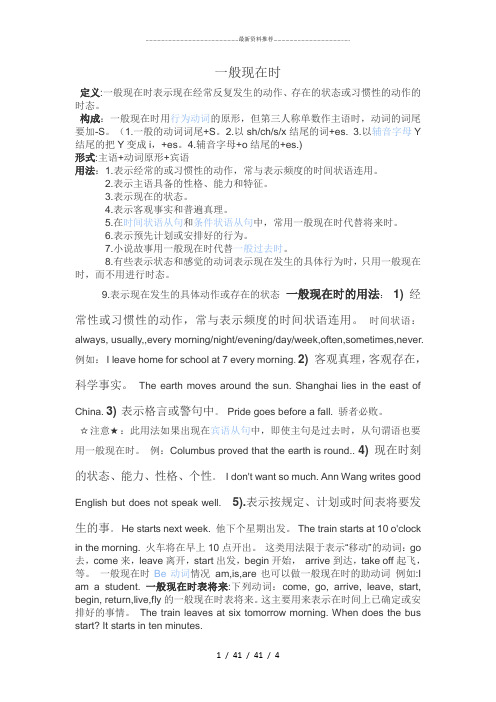
一般现在时定义:一般现在时表示现在经常反复发生的动作、存在的状态或习惯性的动作的时态。
构成:一般现在时用行为动词的原形,但第三人称单数作主语时,动词的词尾要加-S。
(1.一般的动词词尾+S。
2.以sh/ch/s/x结尾的词+es. 3.以辅音字母Y 结尾的把Y变成i,+es。
4.辅音字母+o结尾的+es.)形式:主语+动词原形+宾语用法:1.表示经常的或习惯性的动作,常与表示频度的时间状语连用。
2.表示主语具备的性格、能力和特征。
3.表示现在的状态。
4.表示客观事实和普遍真理。
5.在时间状语从句和条件状语从句中,常用一般现在时代替将来时。
6.表示预先计划或安排好的行为。
7.小说故事用一般现在时代替一般过去时。
8.有些表示状态和感觉的动词表示现在发生的具体行为时,只用一般现在时,而不用进行时态。
9.表示现在发生的具体动作或存在的状态一般现在时的用法:1)经常性或习惯性的动作,常与表示频度的时间状语连用。
时间状语:always, usually,,every morning/night/evening/day/week,often,sometimes,never.例如:I leave home for school at 7 every morning. 2) 客观真理,客观存在,科学事实。
The earth moves around the sun. Shanghai lies in the east of China.3)表示格言或警句中。
Pride goes before a fall. 骄者必败。
☆注意★:此用法如果出现在宾语从句中,即使主句是过去时,从句谓语也要用一般现在时。
例:Columbus proved that the earth is round.. 4) 现在时刻的状态、能力、性格、个性。
I don't want so much. Ann Wang writes good English but does not speak well. 5).表示按规定、计划或时间表将要发生的事。
- 1、下载文档前请自行甄别文档内容的完整性,平台不提供额外的编辑、内容补充、找答案等附加服务。
- 2、"仅部分预览"的文档,不可在线预览部分如存在完整性等问题,可反馈申请退款(可完整预览的文档不适用该条件!)。
- 3、如文档侵犯您的权益,请联系客服反馈,我们会尽快为您处理(人工客服工作时间:9:00-18:30)。
advice [əd'vais] n. 建议;忠告;劝告;通知
patient ['peɪʃ(ə)nt] adj. 有耐心的,能容忍的n. 病人;患者plan [plæn]
discuss n. 计划;平面图vt. 计划;设计;打算orphan ['ɔ:fən] n. 孤儿
inspire [in'spaiə]v. 鼓励,鼓舞
expose [ik'spəuz]v. 暴露,揭露
disease [di'zi:z]n. 疾病
control [kən'trəul]v. 控制
slightly ['slaitli]adv. 轻微地
customer ['kʌstəmə]n. 顾客
astonish [ə'stɔniʃ]v.使……吃惊
during ['djuəriŋ]prep.在……期间
tour [tuə] n. 观光,游览
evidence ['evidəns]n.证据
support [sə'pɔ:t] v. 支持
crime [kraim] n. 罪行
pollute [pə'lut]v. 污染
seriously ['siəriəsli]adv. 严重地
habit ['hæbit] n. 习惯,习性
affect [ə'fekt] v. 影响
exposure[ik'spəuʒə] n. 暴露程度
sunlight ['sʌnlait]n.阳光press [pres]n.报社publish ['pʌbliʃ]v.出版goat n.山羊
tie [tai]n. 领带,
castle ['kɑ:sl, 'kæ-]n. 城堡century ['sentʃuri]n. 世纪project [prəˈdʒekt]n. 项目design [di'zain]v. 设计celebrate ['selɪbreɪt]v. 庆祝injure ['ɪndʒə]v. 伤害,使……受伤accident ['æksidənt]n. 事故guest [ɡest]n. 客人attend [ə'tend]v. 参加adopt [ə'dɒpt]v. 收养search [sɜːtʃ]v. 寻找criminal ['krɪmɪn(ə)l]n. 罪犯expect [ik'spekt]v. 期待,希望match [mætʃ]n. 比赛secret ['si:krit]n. 秘密cover ['kʌvə]v. 覆盖
dust [dʌst] n. 灰尘
frighten ['fraɪt(ə)n]v. 使……害怕,吓唬embarrass [im'bærəs]v. 使……尴尬sound [saund]n. 声音
villager ['vilidʒə] n. 村民
terrify ['terifai]v. 使……惊吓,恐吓sweat [swet]n. 汗水
task [tɑ:sk, tæsk]n. 任务,工作exhaust [iɡ'zɔ:st]v. 使……枯竭,耗尽,榨干energy ['enədʒi]n. 能量,能源murder ['mə:də]v. 谋杀husband['hʌzbənd] n. 丈夫
forest ['fɔrist]n. 森林
fierce [fɪəs] adj. 凶猛的
lion ['laɪən]n. 狮子
tear [tɛə,tiə]v. n.撕碎,眼泪
gift [gɪft]n. 礼物
impatiently [im'peiʃənli]adv. 不耐烦地list [list]v. 列举
sequence ['si:kwəns]n. 顺序sentence ['sentəns]n. 句子
mark [mɑːk]n. 标记,标注attention [ə'tenʃən]n. 注意力
latest ['leɪtɪst]adj. 最新的,最近的album ['ælbəm] n. 相册,专辑release [ri'li:s]v. 发布,释放meaning['mi:niŋ]n. 含义express [ik'spres] v.表达clearly ['kliəli] adv. 清晰的
hit [hɪt] v.撞击,n.受欢迎的人,事huge [hju:dʒ]adj. 大的,巨大的iceberg ['aɪsbɜːg]n. 冰山group[gruːp]n. 群体organize[ˈɔ:gənaɪz]v. 组织trip [trɪp]n. 旅游
scenery['siːn(ə)rɪ]n. 景色,风景charm [tʃɑːm]n 魅力,v使……陶醉soldier ['səʊldʒə]士兵n.
drill [dril]v. 操练
path [pɑːθ]n. 道路
lead [li:d;led] n领导,v.引领break [breɪk]v. 弄坏through [θru:]prep. 通过。
